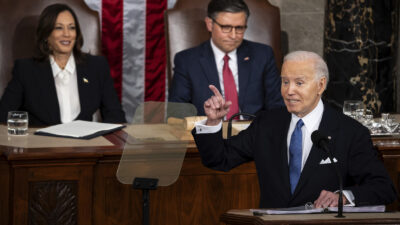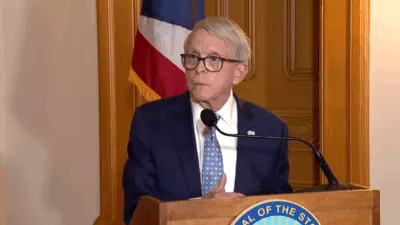
[Check out Postindustrial’s YouTube channel for videos about this and other important topics.]
President Biden’s annual address to Congress hit several points pertaining to recent triumphs in Postindustrial America, as well as its persistent problems.
Biden highlighted new jobs and growth, hoping in part to convince stubborn pessimists in Congress and at home that things in America are improving.
The Biden administration continues to have difficulty messaging about its successes. The president’s favorability numbers remain underwhelming despite numerous accomplishments (CHIPS and Science Act, a historic infrastructure bill, lower crime rates, low unemployment, etc.) and the perpetual whirlwind of scandal enveloping his opponent.
Just over the last year, millions of jobs have been created across the country, many of them in the heart of our region.
And yet, millions remain dour about America’s prospects due to stubborn inflation, soaring housing prices, and the persistent doom-and-gloom drumbeat from some media outlets.
With all that in mind, Biden took a moment in his address to get a little folksy — as he’s wont to do — when talking about one Illinois town.
“A great comeback story is Belvidere, Illinois. Home to an auto plant for nearly 60 years,” the president began his tale.
“Before I came to office, the plant was on its way to shutting down. Thousands of workers feared for their livelihoods. Hope was fading.
“Then, I was elected to office and we raised Belvidere repeatedly with the auto company knowing unions make all the difference.”
Biden’s highlighting of the Illinois auto plant dovetailed nicely into the president’s self-congratulatory acknowledgment of the endorsement he already received from the United Auto Workers union.
“Here tonight is UAW President, Shawn Fain, a great friend, and a great labor leader,” said Biden, pointing to the gallery where the union leader gave the president an enthusiastic thumbs up amid the applause.
“Shawn, I was proud to be the first President in American history to walk a picket line,” Biden added, reminding Americans he picketed with Michigan auto workers last year.
Locking up the UAW vote at a time when American labor organizations are making a comeback should prove beneficial while Biden is on the campaign trail in the Postindustrial States of Michigan, Ohio, and Kentucky, all of which have numerous auto plants employing countless voters.
The trouble at the U.S.-Mexico border has also been foremost on the minds of many voters in Postindustrial America, where anxiety about the mass arrival of undocumented migrants is often played up by GOP lawmakers hoping to capitalize on voters’ fear, and in some unfortunate cases, their prejudices.
Perhaps the best (i.e., most loathsome) physical manifestation of anti-immigrant hate, Georgia Rep. Marjorie Taylor Greene made her discontent with Biden over the situation at the border quite clear, yelling insults at the president during his address while wearing a MAGA hat.
However, Biden clapped back at Greene, acknowledging that it was indeed an undocumented Venezuelan man who recently killed a student at a Georgia university, while also noting that most migrants do not commit heinous acts against citizens.
“I will not demonize immigrants saying they are poisoning the blood of our country,” said Biden, referring to an oft-repeated Trump talking point on migrants. “I will not separate families. I will not ban people because of their faith.”
Biden’s forceful denunciation of anti-migrant rhetoric from Greene and Trump, as well as his condemnation of the Jan. 6 Capitol coup attempt, was also pointed at MAGA lawmakers, many from PI America: Sen. Ron Johnson in Wisconsin, Rep. Scott Perry of Pennsylvania, Ohio Sen. JD Vance, and too many others to mention here.
Biden has had beef with many of the more insufferable MAGA loyalists in their defense of J6ers, and done so with relative success during his term in office, which he often attributes to his own hard-scramble upbringing in pre-Postindustrial America.
“We all saw with our own eyes these insurrectionists were not patriots,” said Biden.
“They had come to stop the peaceful transfer of power and to overturn the will of the people.
“January 6th and the lies about the 2020 election, and the plots to steal the election, posed the gravest threat to our democracy since the Civil War.”
While the lies that convinced thousands of Americans to storm the Capitol spread across the country, so many of those arrested hail from Postindustrial States like Pennsylvania, Ohio, and West Virginia, among others.
Biden also addressed those in the chamber that promulgated the Big Election Lie leading to Jan. 6, and one particular viewer watching at home, who remains stubbornly popular throughout our region.
“My predecessor and some of you here seek to bury the truth of January 6th,” he said. “I will not do that. This is a moment to speak the truth and bury the lies.
“And here’s the simplest truth. You can’t love your country only when you win.”
That last line seemed almost tailor-made for the 2020 fake electors in Wisconsin, Michigan, Georgia, and our other swing states, where nefarious attempts by the Trump administration to overturn the election put our democracy in peril.
In short, Biden’s State of the Union explained how influential Postindustrial America is to the rest of the nation — for better or worse, and sometimes both.







